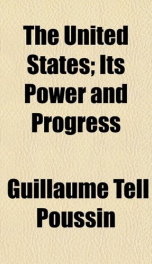the united states its power and progress

Purchase of this book includes free trial access to www.million-books.com where you can read more than a million books for free. This is an OCR edition with typos. Excerpt from book: DISCOVERIES OF THE FRENCH AND SPANIARDS. 43 CHAPTER II. 15301568. DISCOVERIES AND FIRST SETTLEMENTS OF THE FRENCH AND SPANIARDS. James CartierRiver St. LawrenceMontrealFernando do SotoFloridaMississippiLuis Moscoso de AlvaredoPensacolaMobileFrancis de la Roche, de Roberval, first governor of the French possessions in AmericaJames Cartier founds Royal IsleTristan de Luna visits FloridaSchismsof the Anglican Church, of CalvinReligious discussionsReformers, Brownists, Puritans, Independents, CongregationalistsJohn Ribaut and Rene de Laudonniere, in Carolina, discover Port Royal Bay; make the first settlements there; give French names to the riversDestruction of this colony by Pedro MenendezSettlement of St. AugustineDominic de Gourges revenges himself upon the Spaniards. If the fanaticism and religious zeal of the fifteenth century led to the discovery of the New World, the religious struggles which marked the sixteenth and seventeenth centuries have greatly contributed to people it with a race of choice men, equally distinguished for their profound faith and their love of liberty. The commencement of the sixteenth century was marked by the heresy of Luther, by the reforms of John Calvin, and the foundation of the Society of Jesus by Ignatius Loyola. The object and tendency of this society were to oppose the progress of reform, at the head of which was Calvin. Loyola's followers planted their standard upon all points of the globe: in India, Thibet, Cochin China, China, Ethiopia, Abyssinia, California, in the plains of Paraguay, and in the glaciers and snows of Canada. From 1525 to 1534, the French made but fruitless efforts to colonize America. In this latter year, James Cartier, from St. Malo, made a first voyage of discovery towards the Island ...
Users who have this book
Users who want this book
What readers are saying
What do you think? Write your own comment on this book!
write a commentGenre
if you like the united states its power and progress try:
Other books by this author
Do you want to read a book that interests you? It’s EASY!
Create an account and send a request for reading to other users on the Webpage of the book!


